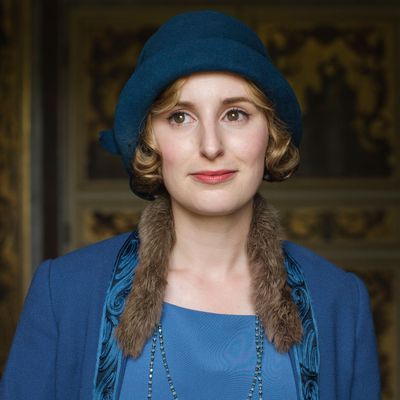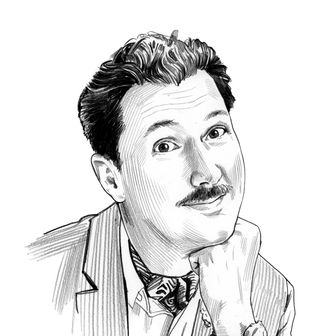
In the series finale of Downton Abbey, Lady Edith was given the ultimate happy ending, finally completing the bumpy road to marrying the man of her dreams, running a successful magazine, and raising the illegitimate daughter she had with a now-deceased man. After all the put downs, neglect, and bad luck life had needlessly thrown at her, no one earned her happiness like our Edith. So much so that her story shouldn’t end with her driving off to her honeymoon with her new husband. We wandered a few years down the road with Edith.
Edith Pelham, the Seventh Marchioness of Hexham, still remembers the first time she came to Brancaster Castle. The autos didn’t seem so rickety back then, but she knew now that they were, with their open tops bumping along the road like a ball being pushed through the grass by a puppy with a short attention span. As the car passed through the first gate 39 years ago, she thought how grand it was that this would all be hers. Today, she looked out of the castle, standing on one of the walkways that connected two of the imposing structures, surveying not the house or the hills, but her home, as the wind pulled at her hair and her eyes watered in retaliation.
Even now, she still couldn’t believe it was hers, after all of those hunts on the grounds, the grand dinners at the long table, and the cozy Christmas mornings with her kind husband, Bertie, and her three daughters. Everything was linked to her girls. Marigold, who doesn’t remember the farm she lived in for her first year, or the nursery at Downton where she lived for her second, came with her. Then there was Violet, named after Edith’s grandmother who died the same year she was born, two years after the wedding. And finally Daisy, two years younger than Violet.
Oh, the row she had with Bertie over her name. After Marigold and Violet, he insisted she also be named after a flower, but Edith thought it so crass. Bertie had an aunt named Daisy, his mother’s sister, but the name always reminded her of a silly cook who worked at Downton and still lived there, but now as a wife of one of the estate farmers, another former serviceman named Andy. She would bring by puddings when Edith and her family would come to visit, always making a fuss over her namesake.
Those visits became increasingly less frequent, especially after Edith’s father died of a heart attack, a few short years after his mother, leaving the house and all its lands to Mary’s son, George, who wasn’t yet 12. Of course, Mary helped run the estate as she had always done, with Carson assisting where he could after his hands got shaky. As for Cora, instead of moving to the dower house, vacated by her late mother-in-law, she decided to return to Philadelphia to be closer to her own family. With all this, it was hardly where Edith felt she belonged. Still, something about Downton always dragged her back.
Edith could never really get over how much her daughters were like her and her sisters. Violet, the middle child, was always her favorite, and the others would chide her for giving the bookish girl so much attention. She was so timid, so afraid to make a mistake that she always hesitated, almost missing out on life. Now she had a store on Abingdon Road that she ran all by herself. Naturally her mother financed it, even though she struggled to understand the dresses it sold, with their short hemlines and solid blocks of color.
Daisy was just like Edith’s sister Sibyl, running off to Paris just after the war. Edith never knew why London wasn’t far enough, but maybe she needed to make her own way. Now she was in love with the continent, and the soldier she met in a hospital there, taking photographs for what would be her first exhibition.
Marigold was all Edith’s, but nothing like her: independent, strong, and quick with a curt remark. It pained her how much she reminded her of Mary when they were younger, and Edith hoped that her admonitions had softened her daughter some. Now, she was living the life Edith could have had if she had given up on a conventional life. Marigold started work at the magazine when she was old enough, working her way up from the copy desk into the editorship after her aunt Laura, Tom’s wife, retired.
Just as Edith was beginning to get maudlin, an enormous new sedan pulled through the gate toward the entrance, rattling the gravel of the driveway. In contrast to its surroundings, it looked completely alien, like a camel sitting outside an igloo. Even after Henry died, his dealerships still gave Mary a new ridiculous car each year. Edith suspected her sister took perverse joy in arriving in them because she knew how they annoyed her so. After more than 70 years together, Edith still was unsure if her sister went out of her way to be so difficult or just couldn’t help herself.
Edith looked down from her perch to the entrance and waved to Mary, who waved back. “I’ll be right down!” she shouted, just barely enough for Mary to hear. The butler, Buckswald, had opened the door, and Mary entered as Edith made her way, hesitatingly, through the corridors and stairs. The castle was too much to manage, not just for the family, whose lives lay in cities near and far, but for her physically. She felt that if she could see inside her knees with some magic telescope, they would look like the façade of this building — pocked, chipped, scarred, and worn to the point where they were close to falling apart.
“Are you nearly ready for this? It’s going to be a long drive back to Downton,” Mary said by way of greeting, impatient to get on with things.
“Yes, I’m quite sure I will. I’ve just been upstairs saying my good-byes. Buckswald, will you please put my trunks in the car?” The butler obliged, carrying the cases out to the drive, leaving the women in the dim light of the cloudy morning.
“Is he all the staff you have left?”
“Quite. I’ve been managing with just him and a cook for the better part of a year. I dismissed her after breakfast.”
“What is going to happen to the place?”
“We’ve sold off most of the land to some developers. They’re going to build houses and such, build up the town. The castle we’ve donated to the government. I believe they want to make it a museum of some sort.”
“Can you imagine?” Mary asked, incredulous. “People just parading around where we used to have tea. You’ll have to pay 20 quid just like everyone else to get into your own drawing room.”
“It never felt like mine, really,” Edith said, “especially after Bertie died. It’s the girls’ now. I kept a house and some land for them, so they’ll always be connected to the place.”
“Well, the dower house will be plenty big for the both of us.”
“Are you sure? There were plenty of years when even the Abbey was too small.”
“Oh, Edith,” Mary said, shrugging her off. “Let’s not go dredging up the past.”
Buckswald stood by the car, holding the passenger’s side door ajar, as they made their way toward it and settled in. Mary turned the engine over and they rode smoothly out through the first gate, the structure passing shadows over the car as it moved.
Looking up at it, that huge hive full not just of those that lived there but everyone that cared for them and all their lives and ambitions, Edith was starting to get emotional. It’s as if all the care that was put into the place, all the energy and focus of so many, had built up a sort of a halo, an intense aura she knew she couldn’t drag out with her.
That’s when she held her gloved hand up to her nose and sniffled a little.
“Don’t go squishy on me now,” Mary implored.
Edith knew not to. If there’s anything life had taught her, it was that it only moves in one direction. It might seem to some facing the wrong direction, that the past was retreating, but it was something else entirely. They were all marching toward some invisible goal. She was returning home, but even that was its own sort of progress, a fulfillment of a future that always was.
As she controlled her tears and laid her hand on the bench seat beside her, she felt Mary’s hand rest slightly on top of hers as she turned her head and looked at Edith, giving her a half smile that she had never quite seen before, one that seemed to be including her rather than pushing her away. That’s when Edith knew she was going to the right place, as the air grew heavy with drizzle and a tiny stream of water streaked from right to left across the windshield.





